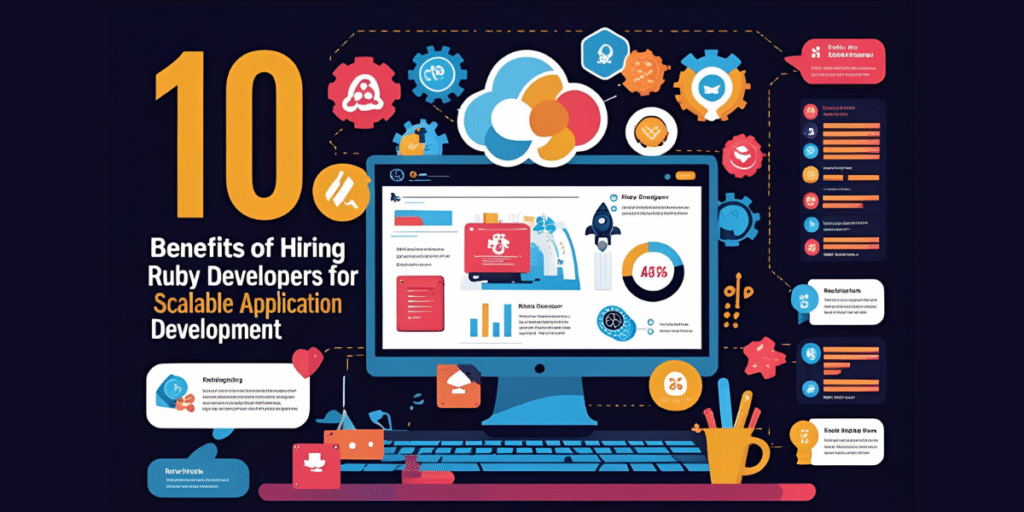
As modern businesses increasingly shift toward digital-first strategies, the demand for robust, scalable, and maintainable web applications is skyrocketing. At the core of this shift lies the choice of technology—and more importantly, the right development talent. Ruby, particularly with its popular framework Ruby on Rails, continues to be a powerful choice for building scalable applications that evolve with growing user demands.
Hiring Ruby developers not only accelerates development cycles but also offers long-term benefits in terms of flexibility, performance, and cost-efficiency. Whether you’re building a new SaaS product, scaling an existing eCommerce platform, or launching a high-traffic marketplace, experienced Ruby developers can be the catalyst for your success.
1. Rapid Development with Ruby on Rails
Ruby on Rails, often the framework of choice for Ruby developers, is renowned for its “convention over configuration” philosophy. This approach eliminates the need for boilerplate code, enabling faster application development with fewer errors.
Why It Matters:
- Developers can generate complete modules using scaffolding commands.
- Features like ORM (Object Relational Mapping) with ActiveRecord simplify database interactions.
- RoR adheres to RESTful design principles by default, reducing architecture complexities.
Real-World Example: Companies like Airbnb and GitHub initially chose Ruby on Rails for its rapid development capabilities, enabling them to build full-featured platforms in months—not years.
2. Clean, Readable, and Maintainable Code
Ruby’s syntax is close to natural language, which makes it highly readable and intuitive. This leads to:
- Easier collaboration between teams
- Simplified code reviews
- Lower maintenance cost
Ruby developers write DRY (Don’t Repeat Yourself) and SOLID code, adhering to best practices that keep applications clean and modular.
Business Impact:
- Quicker onboarding of new developers
- Reduced time spent on debugging and refactoring
- Easier handovers in growing teams or outsourcing environments
3. Built-In Scalability Features
Modern Ruby applications can scale horizontally across servers and containers. With the help of tools like:
- Sidekiq or Resque for background processing
- Redis for caching and message queues
- Puma web server for multi-threaded performance
- Kubernetes and Docker for container orchestration
Ruby developers can design systems that scale efficiently as your traffic or user base grows.
Pro Tip:
A well-architected Ruby application combined with load balancers, CDN integration, and optimized queries can handle millions of users concurrently.
4. Access to a Mature and Supportive Ecosystem
When you hire Ruby developers, you’re not just hiring coding skills—you’re tapping into a mature ecosystem full of open-source tools and libraries (Gems) that save time and effort.
What’s Included:
- Over 170,000+ Gems on RubyGems.org
- Integration support for PostgreSQL, MySQL, MongoDB, and more
- Easy setup with cloud platforms like AWS, Heroku, and DigitalOcean
Result:
Faster feature rollouts, better integrations, and cost-effective architecture planning.
5. High-Level Security for Web Applications
Ruby on Rails comes with security features baked in, and experienced Ruby developers follow OWASP best practices to protect against common web vulnerabilities.
Key Security Features:
- CSRF protection
- SQL Injection protection via ORM
- Secure password hashing with BCrypt
- HTTPS enforcement and SSL integration
Use Case:
If you’re handling sensitive user data—such as in FinTech, Healthcare, or eCommerce—Ruby developers help you stay compliant with security standards like GDPR and HIPAA.
6. Cost-Effective Development
Hiring Ruby developers helps reduce both initial and ongoing development costs.
How?
- Faster development cycles mean fewer billable hours.
- Ruby’s expressive syntax means less code to write.
- Many open-source gems reduce the need for expensive third-party integrations.
For example, tools like Devise handle user authentication and authorization without the need to build from scratch—saving weeks of effort.
Outcome:
More functionality delivered per dollar spent.
7. Rich Set of Libraries and Gems
The Ruby community has contributed a vast array of gems (open-source libraries) that help developers add features quickly and efficiently.
Must-Know Gems:
- Devise – Authentication
- Pundit – Authorization
- Sidekiq – Background processing
- RSpec – Testing
- ActiveAdmin – Admin dashboards
- CarrierWave – File uploads
Developer Impact:
Instead of reinventing the wheel, Ruby developers can plug in well-tested tools that enhance performance and reduce bugs.
8. Excellent Testing Capabilities
Ruby is known for promoting Test-Driven Development (TDD). Frameworks like RSpec, Minitest, and Capybara make writing and automating tests a natural part of the development process.
Why Testing Matters:
- Reduces production bugs
- Makes refactoring safer
- Supports continuous integration (CI) and continuous deployment (CD)
Tools Used:
- RSpec – Behavior-driven testing
- FactoryBot – Mocking and test data
- Capybara – UI and end-to-end testing
Hiring Ruby developers who embrace TDD ensures long-term code health and product stability.
9. Cross-Industry Applicability
Ruby’s versatility makes it a good fit across various industries:
| Industry | Application Use Case |
| E-Commerce | Storefronts, shopping carts, checkout systems |
| SaaS | Subscription management, user dashboards |
| FinTech | Secure transaction portals, analytics tools |
| HealthTech | HIPAA-compliant data systems, appointment scheduling |
| EdTech | Course management platforms, student dashboards |
Why It Matters: You’re not locked into a single-use-case tech stack. Ruby developers can pivot as your business model evolves.
10. Community-Driven Innovation
Ruby has one of the most engaged and helpful developer communities in the world. The open-source nature of the ecosystem means your Ruby developers are constantly supported by:
- Online forums like Stack Overflow and Reddit
- Official documentation and GitHub discussions
- Global conferences like RailsConf and RubyKaigi
Bonus:
Developers can contribute back to open-source libraries, which boosts team morale and product credibility.
Final Thoughts
Choosing to hire Ruby developers is a strategic move for any company aiming to build scalable, secure, and efficient web applications. From rapid MVP launches to high-performance enterprise applications, Ruby offers the tools, ecosystem, and talent required to succeed in today’s competitive market.
Whether you’re a startup seeking agility or an enterprise looking to modernize your tech stack, experienced Ruby developers bring the balance of speed, security, and scalability that can future-proof your application.
FAQs
Q1: Is Ruby still relevant in 2025?
Yes. Ruby, especially with Ruby on Rails, is actively maintained and widely used in web development for its productivity and developer happiness.
Q2: How do I evaluate a Ruby developer before hiring?
Focus on experience with Ruby on Rails, their GitHub contributions, understanding of testing tools like RSpec, and performance optimization strategies.
Q3: Can Ruby applications scale like Node.js or Python?
Yes. With proper architecture and experienced developers, Ruby applications scale efficiently using modern cloud services and background processing tools.
Q4: Is it better to hire a freelancer or a dedicated Ruby development team?
It depends on your project’s scope. Freelancers are great for short-term or prototype work, while dedicated teams provide long-term reliability and better collaboration.
Q5: What kind of apps are best built with Ruby?
Ruby is ideal for SaaS platforms, content management systems, eCommerce sites, social networks, and internal enterprise tools.




